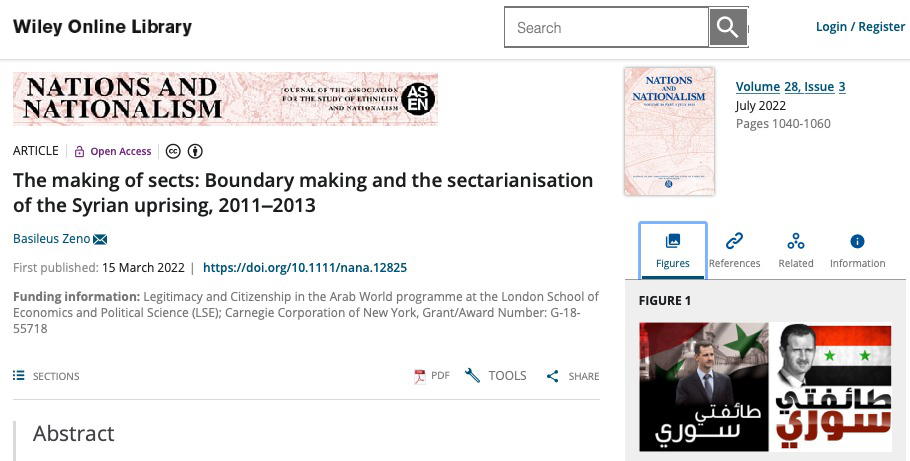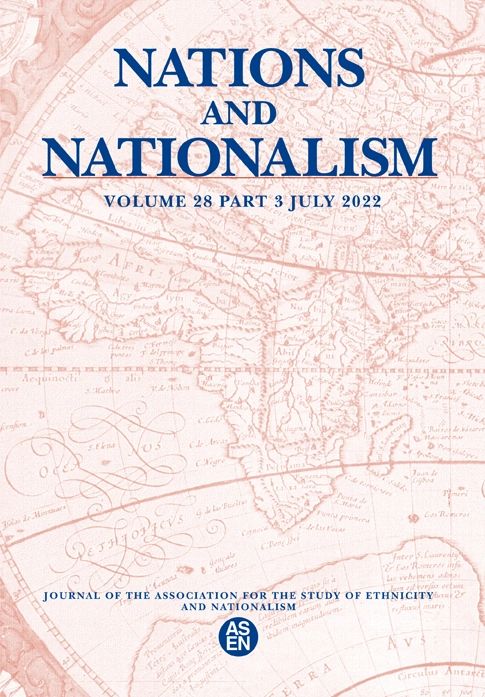Jadaliyya Syria page co-editor Basileus Zeno’s article “The making of sects: Boundary making and the sectarianisation of the Syrian uprising, 2011-2013,” has received the 2022 Syrian Studies Association (SSA) Prize for its annual Most Outstanding Article Prize. Zeno was announced the winner on December 3, 2022 and honored during the SSA’s reception at the 2022 Middle East Studies Association (MESA) Annual Meeting.
The committee, composed of professors Dawn Chatty (University of Oxford), James Reilly (University of Toronto) and Michael Provence (UCSD), praised “The making of sects” as “impressive,” and written “with great sophistication” to be “one of the most insightful, learned, and convincing reconstructions of the Syrian Revolution yet.”
The prize committee summarized the article’s unique contribution to scholarship in the most glowing terms:
Basileus Zeno has written one of the most insightful, learned, and convincing reconstructions of the Syrian Revolution yet. His work peels back the layers to show how the idealistic hopes of the early months became degraded. With great sophistication, he explains a process in which political actors worked relentlessly and cynically to ensure that sectarian identity became destiny, and indeed became personal prisons from which no one could escape. Zeno’s article is impressive with its careful attention to how Syrians’ sense of sect-identity, a banal social fact, was mobilized for sectarian political purposes. His account of how opposition organizers’ slogans shifted from universalist to sectarian themes, and what lay behind these shifts, offers readers a nuanced and finely grained view of the weaponization of sect in the Syrian uprising. The interests and tactics of the Assad regime and of regional actors played critical parts in this process of social and political fragmentation. His article is one piece of a larger story about the malleability of sect-identity, in contrast to the often primordialist framings of this phenomenon.
Additionally, Max Weiss’s book “Revolutions Aesthetic: A Cultural History of Baʻathist Syria” (Stanford University Press) won the “Best Book Prize 2022;” and Adam Mestyan’s article “From administrative to political order? Global legal history, the organic law, and the constitution of mandate Syria, 1925-1930” received Honorable Mention.
The Syrian Studies Association (SSA) awards an annual prize for the most outstanding article or book chapter each year. The award aims to promote and highlight excellence in research on Bilad al-Sham until 1918 and on Syria in the period following. The SSA is an international association organized to encourage and promote research and scholarly understanding of Syria in all periods and in all academic disciplines.
It is worth mentioning that an earlier version of this article was presented at the 2018 International Studies Associations (ISA) Conference and won the 2019 Best Graduate Student Paper Award in Religion and International Relations from the ISA. The article was published in Nations and Nationalism in March 2022.
***
You can watch a conversation with Basileus Zeno moderated by Bassam Haddad about “The making of sects” below.
Basileus Zeno is a Sessional Assistant Professor in the Department of Politics at York University, and a co-editor of Jadaliyya’s Syria Page. He is also a MESA Global Academy Fellow (2021-2023). He received his Ph.D. in Political Science from the University of Massachusetts, Amherst in 2021. Following that, he was awarded Karl Loewenstein Fellowship in Political Science at Amherst College. Basileus also holds a B.A. (2006) and M.A. (2011) in Classical and Islamic Archaeology from Damascus University (Syria), and M.A. (2015) in Political Science and International Relations from Ohio University (USA).
Zeno’s writing has been published in academic as well as public-facing outlets, including Nations and Nationalism, Middle East Law and Governance, Digest of Middle East Studies, and The Washington Post. Additionally, Zeno received grants from major international institutions, including the Open Society Foundations, Carnegie Corporation of New York, and London School of Economics and Political Science. His work has combined research, advocacy and policy work on political violence, refugees and forced migration, human rights, nationalism, cultural heritage, security, and interpretive, decolonizing methodologies. He has been invited by academic and public institutions as a writer and speaker on issues related to Syria, war, and displacement. He presented his work at academic institutions such as the University of Chicago, Harvard University, Duke University, UCLA, Wesleyan University, Hampshire College, Mount Holyoke College, Smith College, Wellesley College, and numerous other places.

